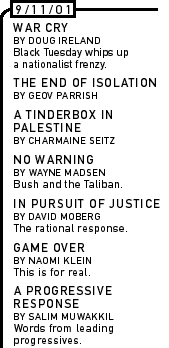|
|

|

|

|
|
|
| |
|
|
|
Now is the time in the game of war when we dehumanize our enemies. They are utterly incomprehensible, their acts unimaginable, their motivations senseless. They are "madmen" and their states are "rogue." Now is not the time for more understanding--just better intelligence. These are the rules of the war game. Feeling people will no doubt object to this characterization: War is not a game. It is real lives ripped in half; it is lost sons, daughters, mothers and fathers, each with a dignified story. This act of terror was reality of the harshest kind, an act that makes all other acts seem suddenly frivolous, game-like. It's true: War is most emphatically not a game. And perhaps it will never again be treated as one. Perhaps September 11, 2001 will mark the end of the shameful era of the video game war. Watching the coverage on Tuesday was a stark contrast to the last time I sat glued to a television set watching a real-time war on CNN. The Space Invader battlefield of the Gulf War had almost nothing in common with what we have seen this week. Back then, instead of real buildings exploding over and over again, we saw only sterile bomb's-eye views of concrete targets--there and then gone. Who was in these abstract polygons? We never found out. Since the Gulf War, American foreign policy has been based on a single brutal fiction: that the U.S. military can intervene in conflicts around the world--in Iraq, Kosovo, Israel--without suffering any U.S. casualties. This is a country that has come to believe in the ultimate oxymoron: a safe war. The safe war logic is, of course, based on the technological ability to wage a war exclusively from the air. But it also relies on the deep conviction that no one would dare mess with the United States--the one remaining superpower--on its own soil. This conviction has, until Tuesday, allowed Americans to remain blithely unaffected by--even uninterested in--international conflicts in which they are key protagonists. Americans don't get daily coverage on CNN of the ongoing bombings in Iraq, nor are they treated to human-interest stories on the devastating effects of economic sanctions on that country's children. After the 1998 bombing of a pharmaceutical factory in Sudan (mistaken for a chemical weapons facility), there weren't too many follow-up reports about what the loss of vaccine manufacturing did to disease prevention in the region. And when NATO bombed civilian targets in Kosovo--including markets, hospitals, refugee convoys, passenger trains and a TV station--NBC didn't do "streeter" interviews with survivors about how shocked they were by the indiscriminate destruction. The United States has become expert in the art of sanitizing and dehumanizing acts of war committed elsewhere. Domestically, war is no longer a national obsession, it's a business that is now largely outsourced to experts. This is one of the country's many paradoxes: though the engine of globalization around the world, the nation has never been more inward looking, less worldly. No wonder Tuesday's attack, in addition to being horrifying beyond description, has the added horror of seeming, to many Americans, to have arrived entirely out of the blue. Wars rarely come as a complete shock to the country under attack, but it's fair to say that this one did. On CNN, USA Today reporter Mike Walter was asked to sum up the reaction on the street. What he said was: "Oh my god, oh my god, oh my god, I just can't believe it." The idea that one could ever be prepared for such inhuman terror is absurd. However, viewed through the U.S. television networks, Tuesday's attack seemed to come less from another country than another planet. The events were reported not so much by journalists as by the new breed of brand-name celebrity anchors who have made countless cameos in Time Warner movies about apocalyptic terrorist attacks on the United States--now, incongruously reporting on the real thing. And for a bizarre split second on Tuesday night, CNN's logo "America Under Attack" disappeared and in its place flashed a logo that said "Fighting Fat"--an eerie ghost graphic that the day before had passed as news. The United States is a country that believed itself not just at peace but war-proof, a self-perception that would come as quite a surprise to most Iraqis, Palestinians and Colombians. Like an amnesiac, the United States has woken up in the middle of a war, only to find out the war has been going on for years. Did the United States deserve to be attacked? Of course not. That suggestion is ugly and dangerous. But here's a different question that must be asked: Did U.S. foreign policy create the conditions in which such twisted logic could flourish, a war not so much on U.S. imperialism but on perceived U.S. imperviousness? The era of the video game war in which the U.S. is always at the controls has produced a blinding rage in many parts of the world, a rage at the persistent asymmetry of suffering. This is the context in which twisted revenge-seekers make no other demand than that American citizens share their pain. Since the attack, U.S. politicians and commentators have repeated the mantra that the country will go on with business as usual. The American way of life, they insist, will not be interrupted. It seems an odd claim to make when all evidence points to the contrary. War, to butcher a phrase from the old Gulf War days, is the mother of all interruptions. As well it should be. The illusion of war without casualties has been forever shattered. A blinking message is up on our collective video game console:
Game Over.
|





